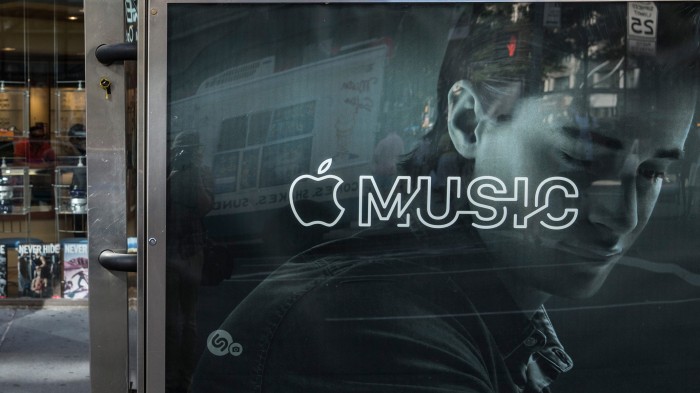iPhone Slump Means Apple Must Compete Harder with Amazon and Google
Apple’s latest financial results revealed yesterday that iPhone sales fell for the first time since its 2007 debut. They also contain hints that the company is pivoting toward a new way to extract money from consumers that will intensify its competition with other computing giants such as Google. That could profoundly change the tech all those companies offer to consumers.
In contrast to the softening iPhone sales, Apple reported healthy growth from its services business, which includes products such as Apple Pay, Apple Music, and iTunes. Services harvested $6 billion in revenue for the quarter, 20 percent more than the same period last year.
Apple appears determined to push more money-making services at its huge customer base—which includes more than a billion active users of iPhones and other devices.

The company only started breaking out services revenue for investors at the start of the year, with CEO Tim Cook calling on them to take notice of what he called “one of the largest services businesses in the world.”
However, Apple has not traditionally relied much on services, where it faces much stiffer competition from companies such as Google, Amazon, Microsoft, and Facebook. Some Apple services, such as Apple Maps, the MobileMe cloud backup and storage service and its successor iCloud, and Apple Music, have been seen as below the standards Apple brings to its hardware products, and lacking compared to competing services from Google and others. Analyst Ben Thompson recently suggested that the fact that Apple does not have a division dedicated to services makes it difficult for the company to build, maintain, and improve them as well as companies like Google or Amazon.
Apple clearly has enough talent and money to make a very serious attempt at improving its services and inventing new ones, though. It has recently hired and acquired considerable talent in artificial intelligence, something crucial to many of Google’s most impressive services, as well as Amazon’s recent hit Alexa, the voice-operated home assistant gadget.
Consumers may have a lot to gain from Apple’s pivot. Better services on iPhones and other Apple gadgets could make them much more useful, and Google and others may feel compelled to work harder on their own offerings.
There may also be downsides. Apple and Google have sometimes opted to erect barriers to compatibility between their competing services. Apple won’t let you set Google Maps as the default mapping application on an iPhone, for example. Finding ways to lock users in or make it hard for them to switch to a competitor is one strategy for keeping revenues flowing from a services business, and Apple may feel pressured to use it more.
(Read more: CNBC, WSJ, Stratechery, Bloomberg)
Keep Reading
Most Popular
Large language models can do jaw-dropping things. But nobody knows exactly why.
And that's a problem. Figuring it out is one of the biggest scientific puzzles of our time and a crucial step towards controlling more powerful future models.
How scientists traced a mysterious covid case back to six toilets
When wastewater surveillance turns into a hunt for a single infected individual, the ethics get tricky.
The problem with plug-in hybrids? Their drivers.
Plug-in hybrids are often sold as a transition to EVs, but new data from Europe shows we’re still underestimating the emissions they produce.
Stay connected
Get the latest updates from
MIT Technology Review
Discover special offers, top stories, upcoming events, and more.